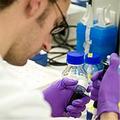HL: I'm here at the Science Media Centre in London where Professor Jeanne Bell and her colleagues, research nurse Tracey Miller and Dr Colin Smith have just given a press briefing. They reported the results of the MRC supported Sudden Death Brain and Tissue Bank Pilot Project in which suddenly bereaved families were approached to ask if they would donate their relative's tissue for medical research. Professor Bell, can you tell us why the tissue bank was set up and what you've found? JB: Over the years it's become completely apparent that there is a worldwide shortage of normal human brain tissue which is needed as a basis for comparison of all the disorders of the brain and this project was set up to find out whether the forensic autopsy service would meet this need. And we wanted to find out whether relatives who had been suddenly bereaved, would be prepared to donate tissue and organs including the brain for the purposes of research. We found that 96% of families were indeed willing to donate tissue samples and one in five of those families were actually prepared to donate the brain.
HL: Could you just tell me the difference between a forensic and a hospital post mortem?
JB: The large majority of post mortem examinations which are undertaken at the present time is in the forensic sector under the control of the legal authorities. It also seemed to us that because people die suddenly of conditions such as heart attacks, asthmatic attacks, the chances of finding normal brain tissue would be much higher than in the hospital autopsy service, where of course research activities are already consented. But there is no mechanism or has been no mechanism in the past for approaching families who have been suddenly bereaved and whose relative undergoes a forensic autopsy.
HL: Now that you have access to forensic post mortem service, Tracey Miller, I understand that it's your job to actually approach the families to ask if they'll give consent to donate tissue. Now could you tell me how you go about doing this?
TM: Basically what happens is once I'm notified of the deaths which have occurred in the previous 24 hours and the legal authority has given me permission to approach the family, we identify the next of kin and the fact that they're aware of the death and then I make a phone call to the family, explain what the procedure is due to the circumstances of the death and gently ease into the conversation, giving the family the opportunity to donate tissues or organs for research. HL: Dr Colin Smith, can you tell us how the tissue samples that are donated actually be used in research in the future?
TM: Researchers both locally, nationally and internationally can request tissue from the bank in Edinburgh. The key areas in which we have tissue which we feel will be valuable for researchers are for control tissue for investigators investigating specific neurological conditions who require control tissue at various ages with which to compare their disease processes. Equally it was very active research in the field of drug related deaths; we have early untreated psychiatric disorders which is of great interest to researchers in psychological medicine, particularly fields such as schizophrenia, some of the depressive disorders and we're always looking for what we consider to be rare neurological conditions which do not come through the hospital autopsy system but occasionally come through the forensic autopsy system and we feel it's very important that we if possible, retain tissues from these cases, of course with full consent of the relatives. In the future I would like to see this extended to involve particularly traumatic brain injury which is a huge medical problem worldwide and these conditions all fall within the setting of sudden death and will be of great value to researchers worldwide.
HL : 96% of the families that you approached, agreed to donate tissue for research; how would you like to see this project develop?
JB : Families have indicated that they derived a measure of comfort from making the donation; some good had come out of their loss and they have expressed the view that they would wish this opportunity to be offered to all bereaved families. So we hope that other centres can lean on and learn from the experience we've had in Edinburgh and that this kind of project can be widened out across the UK so that it can meet the need of the medical researchers. HL: Hazel Lambert JB: Professor Jeanne Bell TM: Tracey Miller

